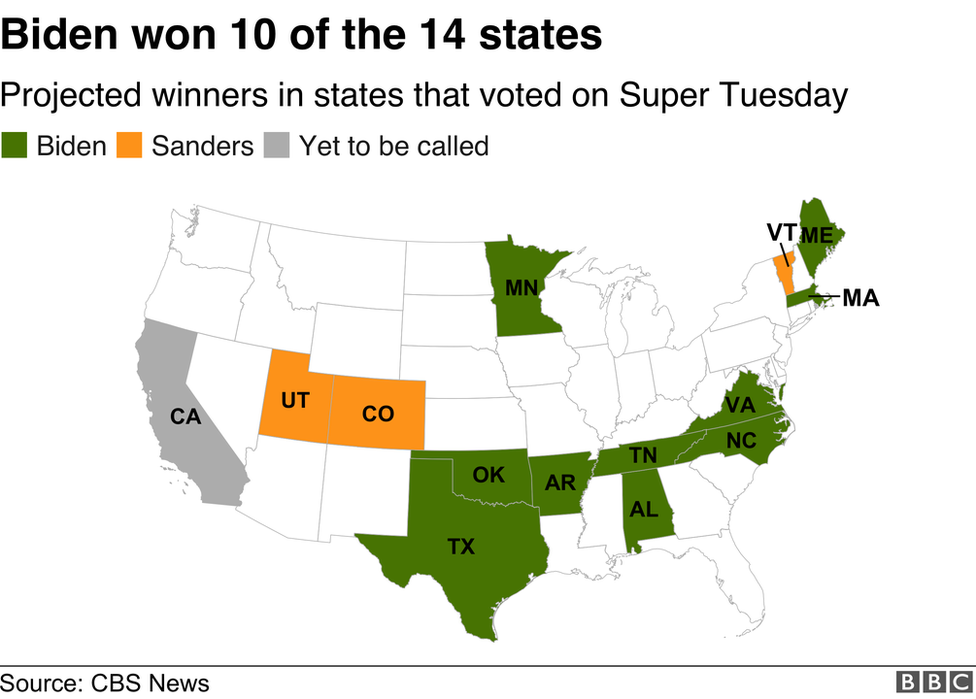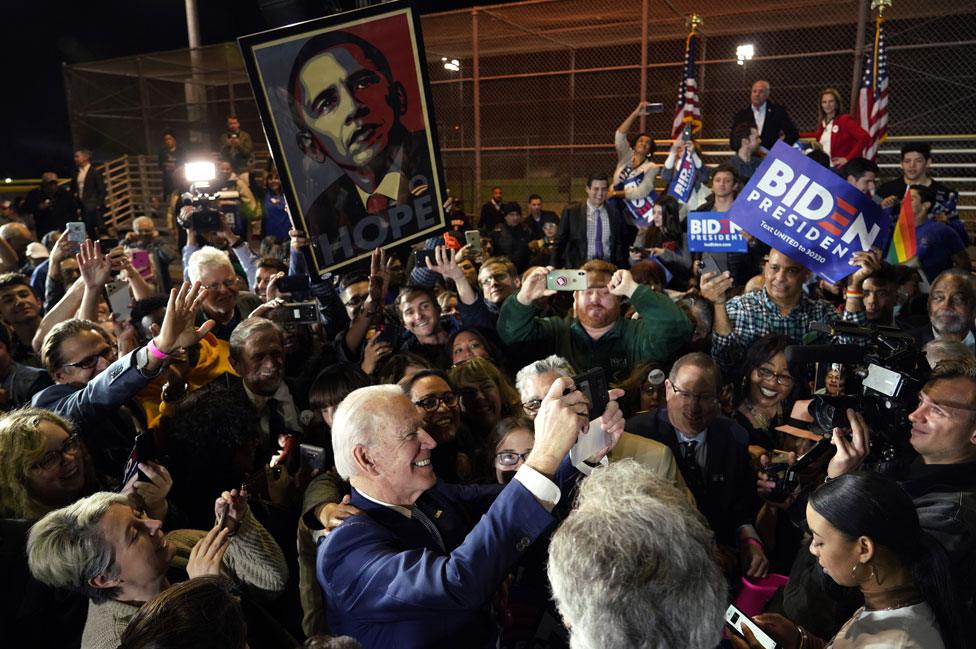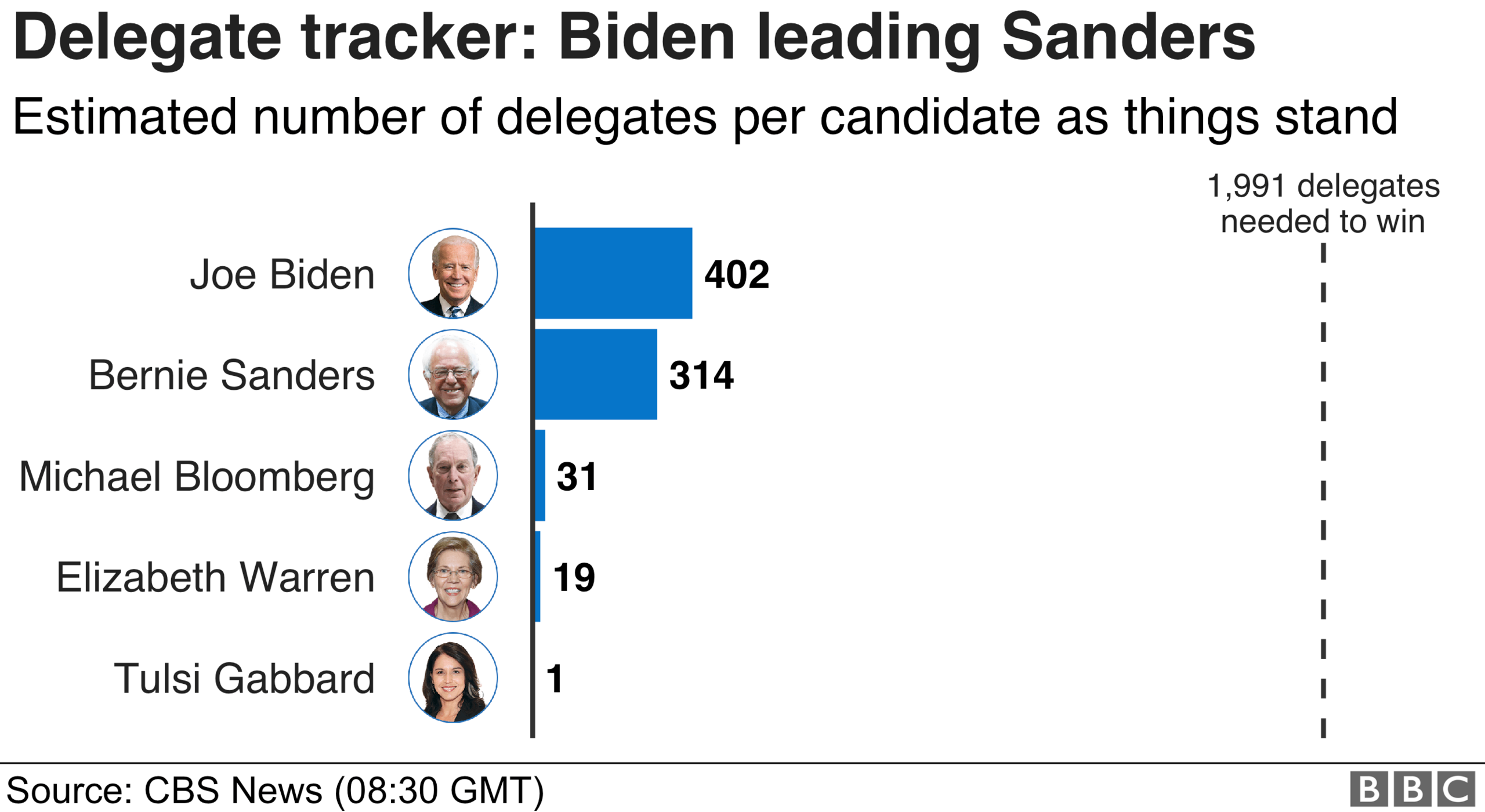Super Tuesday: Biden seals comeback with string of victories
- Published
What unites these two bitter rivals?
Joe Biden has won nine of the 14 states that voted to pick a Democratic White House candidate on Super Tuesday, a remarkable rebound for his campaign.
The former US vice-president overturned predictions to narrowly take the key state of Texas from his main challenger, Bernie Sanders.
However, Mr Sanders is projected to win California - the biggest prize of the night - as well as three other states.
They lead the race to face Republican President Donald Trump in November.
Former New York mayor Michael Bloomberg spent more than $500m (£390m) of his own money on his campaign, but did not win a single state. And Senator Elizabeth Warren, once the frontrunner in the race, suffered a humiliating defeat to Mr Biden in her home state of Massachusetts.
Super Tuesday awards more than 1,300 of the 1,991 delegates needed to clinch the Democratic White House nomination in July.
As things stand, Mr Biden has 402 delegates and Mr Sanders 314. However, results from California, which has 415 delegates, could affect the current standing.

How important is Biden's performance?
Only last month, Mr Biden's campaign was all but written off by some observers after he finished a poor fourth in the Iowa caucuses and fifth in the New Hampshire primary.
But on Tuesday, Mr Biden won Texas - the second biggest state with 228 delegates - along with Massachusetts, Minnesota, Oklahoma, Arkansas, Alabama, Tennessee, North Carolina and Virginia.
Maine, which has 24 delegates, is also yet to declare but partial results put Mr Biden slightly ahead of Mr Sanders.
Virginia and North Carolina are crucial because they are key swing states in the 2020 election.
Exit polls across the board suggested Mr Biden - who was vice-president to Barack Obama - attracted large majorities of African-American voters, a crucial bloc for the Democratic party.
Mr Biden, 77, also appears to have won among the type of suburban voters who pollsters say have been turning away from the current US president.
"We are very much alive," Mr Biden told a crowd in Los Angeles. "Make no mistake about it, this campaign will send Donald Trump packing."

How is Sanders doing?
If Mr Sanders, 78, does win California, as the Associated Press news agency projects, he will pick up the lion's share of the whopping 415 delegates that the Golden State sends to the party convention.
The left-wing senator also won his home state of Vermont, along with Colorado and Utah.
Mr Sanders had been heavily favoured to win Texas, but it was finally claimed by Mr Biden.

In a victory speech, Mr Sanders lambasted Mr Trump, but also took a shot at Mr Biden.
"We're taking on the political establishment," he said. "You cannot beat Trump with the same-old, same-old kind of politics."
The next primaries take place on 10 March in Michigan, Washington state, Idaho, Mississippi, Missouri and North Dakota, with 352 delegates available.

How did Biden bounce back?

Joe Biden came into Super Tuesday hoping his momentum from a surprisingly big South Carolina win would translate into a strong showing in some of the Super Tuesday states and allow him to keep within sight of Bernie Sanders in the delegate count.
By that metric, his evening succeeded beyond his best expectations.
His support among black voters, which was on display in South Carolina, was replicated across the South and helped offset Bernie Sanders' strength with Hispanic voters in Texas.
The endorsements mattered too - in Dallas on Monday, he had the support of Amy Klobuchar, Pete Buttigieg and Beto O'Rourke, and he ended up greatly over-performing his polls in that state and winning Klobuchar's Minnesota.
But now the hard work begins. He is in for a state-by-state slog against Mr Sanders that could stretch all the way to the Democratic National Convention in July.
He'll have to fundraise and organise rapidly to make up for the Vermont senator's advantages. Meanwhile, Republicans are going to start training their fire on him - again.
If he ends up winning the nomination, after being left for dead just a few weeks ago, he will have earned it.

How did Bloomberg and Warren do?
Ms Warren, 70, lost to Mr Biden in Massachusetts despite the fact that he did not campaign in the state or spent money advertising there.
Mr Bloomberg, 78, could only pick up a consolation win in the tiny US territory of American Samoa.
He did, however, garner enough votes in California and Texas to pick up delegates, according to incomplete results.
Mr Bloomberg was appearing on a presidential ballot for the first time after skipping all four contests last month.
Bloomberg loses badly then rolls out Trump jokes
But after his poor showing, he announced on Wednesday he was ending his campaign and would support Mr Biden.

Read more on Joe Biden

WHO IS HE? Third White House run for 'Middle Class Joe Biden'
WHAT HIS SUPPORTERS SAY: Is this Joe Biden’s big comeback?
ON THE CAMPAIGN TRAIL: Watch Biden on 'No Malarkey' tour
WHERE HE STANDS: Against other Democrats like Obama
HIS RIVALS: All the Democrats and their key issues

What's at stake in Biden v Sanders?
The Democratic Party is at a crossroads as its voters decide which candidate has the best chance of denying Mr Trump a second term in office this autumn.
Once a crowded field of more than two dozen, celebrated for its women and candidates of colour, the Democratic contest now increasingly looks like a two-man race between two white male septuagenarians.
Mr Biden, a moderate, and Mr Sanders, a liberal firebrand, offer starkly different visions for America's future.
The former vice-president presents himself as an electable pragmatist who will bring incremental change and restore "decency" after the Trump presidency.
But critics say his campaign is uninspiring, and that he brings too much political baggage from his lifelong career as a Washington insider.
Mr Sanders' detractors say a self-described democratic socialist cannot win over the swing voters needed to capture the White House.
He is planning to transform the American economy with a multi-trillion dollar, higher taxation blueprint covering everything from healthcare to education.
BBC reporters deliver their verdicts on Biden, Sanders and Bloomberg